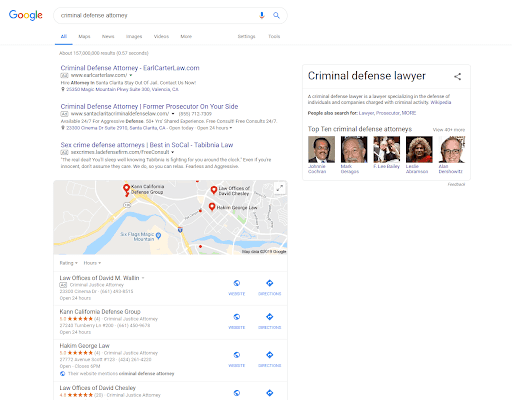For years, attorneys have been told that where their website ranks in search engines (like Google) is the key to a strong digital presence.
“If you land on page #1 or #2 of the search results, you can assume your law firm’s digital presence is rock solid.” Or so the story went.
But the internet always changes. What worked ten, five, or even one year ago doesn’t hold the same weight today.
Here’s the truth: SEO—how your website ranks in organic search results—isn’t as important as it once was.
That isn’t to say that SEO lacks value; it is still important. But focusing only on ranking high in search results isn’t always the best strategy to get your website noticed or to attract new clients.
So How Are Lawyers Supposed to Use SEO?
Take a look at a typical Google search for “criminal defense attorney.”

You’ll see that the top results are paid ads, followed by map listings. Even if your firm ranks #1 for “criminal defense attorney,” potential clients will probably see several other law firms before yours.
In fact, the first organic result might not even show up until further down the page, below the ads and map listings.

How can “Santa Clarita Criminal Defense Law” rank so far down, despite having a strong website and great criminal law SEO?
It’s because Google’s search results are changing to focus more on what’s best for the user (like high-quality, helpful content) and what supports Google’s business (paid ads).
What Really Matters for Attorneys Today
In the past, where your site ranked played a big role in how many leads or clients you could attract, but now it’s not as important.
Yes, SEO still matters, but it’s more about building your firm’s brand, not just generating leads.
Think of your site’s ranking as “digital signage”—like a billboard or an ad in a newspaper. It’s helpful, but it’s not the main way to attract or keep clients.
Good SEO is about strengthening your brand’s reputation. It’s about showing your community that your firm is a trusted authority in the legal field, not just about getting traffic or leads.
Instead of fixating on your site’s ranking, law firms that invest in marketing should focus on the bigger picture: “Are we getting more clients, more cases, or more business than before?”
If the answer is “Yes,” then your marketing efforts are clearly working.





